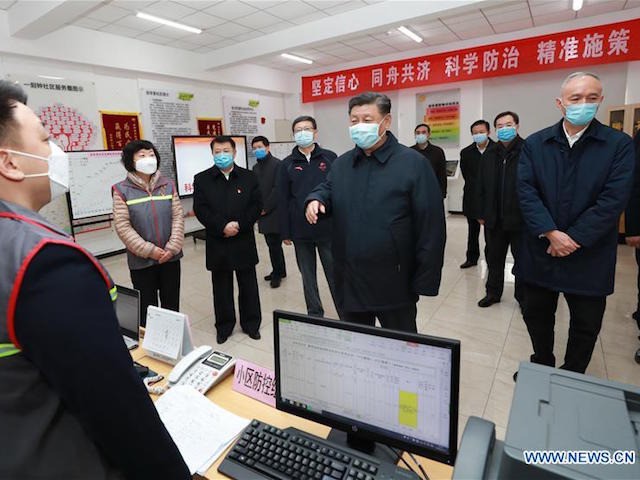Communist dictator Xi Jinping finally showed his face in Wuhan, China, on Tuesday after months of chaos, panic, and death at the epicenter of the Chinese coronavirus outbreak.
Xi had largely avoided being seen in public since China announced the discovery of the new coronavirus on January 20, nearly a month after local authorities shut down a wild meat market in Wuhan where authorities initially believed the virus originated. Xi visited a hospital in Beijing for photos in face masks in mid-February when the capital had not yet documented large numbers of cases, but otherwise made his presence known through photos of private meetings with elite Communist Party figures in state propaganda. In January, as China prepared to identify the unknown virus in Wuhan, Xi simply left the country for an allegedly pivotal state visit to Myanmar.
In contrast, his second-in-command, Premier Li Keqiang, visited Wuhan in January, a week after the official announcement of an outbreak.
Chinese state media struggled to make Xi’s visit to Wuhan appear to be a positive sign to the world that the outbreak is waning in its origin and that Wuhan is finally safe enough for the dictator to risk being present there. It also attempted to make the argument that Xi had been personally orchestrating the coronavirus response throughout the entirety of the outbreak, publishing infographics listing phone calls and meetings that Xi allegedly participated in from the safety of his offices in Beijing.
Xi made several stops in Wuhan on Tuesday, including Huoshenshan Hospital, the building that China claims to have built in less than two weeks to house quarantined coronavirus patients. He also reportedly visited quarantined Wuhan residents; state media did not note if the people Xi visited were coronavirus patients or Wuhan residents forced into quarantine who had not tested positive. Wuhan, a city of 11 million, is under complete quarantine, as are several other urban areas throughout its Hubei province.
“Xi learned about the hospital’s operations, treatment of patients, protection for medical workers and scientific research there,” the state propaganda outlet Global Times claimed. Xi also visited local Communist Party officials and “held a meeting aimed at comprehensively deepening the reform,” which the Times did not elaborate on.
“Xi personally commands the people’s war against the epidemic. He has been paying constant attention to the epidemic prevention and control work and made oral or written instructions every day,” the Global Times insisted. The newspaper declared that Xi’s visit is “sending a strong signal to the entire country and the world that China is ascending out of the darkest moment amid the outbreak, and the battle against the epidemic has now entered the next stage, analysts said.”
“The turning point of China’s domestic fight against the epidemic has arrived,” the newspaper continued.
Xinhua, the Chinese Communist Party news agency, quoted Xi as saying that the outbreak “has basically been curbed” in Wuhan and in Hubei generally.
“Xi said after hard work, the situation in Hubei and Wuhan has shown positive changes with important progress, but the prevention and control task remains arduous,” Xinhua reported.
Communist Party officials in Wuhan and at the provincial level took the opportunity of Xi’s visit to demand praise for the dictator, who has largely been absent from coronavirus response. As the South China Morning Post reported, the officials had previously said all Wuhan residents “should be taught to be grateful to Xi Jinping and the party over the handling of the [Chinese coronavirus] outbreak” with “an extensive gratitude education campaign.” Xi purged the Party leaders in the region in February and the Party in Beijing blamed the local officers for the initial cover-up and failure to adequately prepare locals to contain the virus, replacing them with the current Party leaders, all Xi loyalists.
“Wuhan is a city of heroes, and the Wuhan people are heroes,” Ying Yong, the head of the Hubei Communist Party, said on Tuesday. “[Wuhan’s people] … have shown resilience and strong will … I hereby express my sincere gratitude to the people of Wuhan and Hubei.”
Wuhan reportedly documented 19 new cases of Chinese coronavirus on Monday, the lowest number yet since the outbreak erupted. Hubei has confirmed by far the largest number of cases in the world – 67,760 at press time and 3,024 deaths. Mounting evidence suggests that the Communist Party has significantly deflated these numbers by failing to properly test those exhibiting coronavirus symptoms and mislabeling deceased as having died of “pneumonia,” which the coronavirus causes. China has also expanded its censorship of internet commentary on the virus and arrested individuals for openly speaking out against the poor response to the virus from the Communist Party.
The World Health Organization (WHO), which has discouraged identifying the Chinese coronavirus as Chinese, has repeatedly praised China for its work to contain the virus – now present in 115 nations and territories.

COMMENTS
Please let us know if you're having issues with commenting.